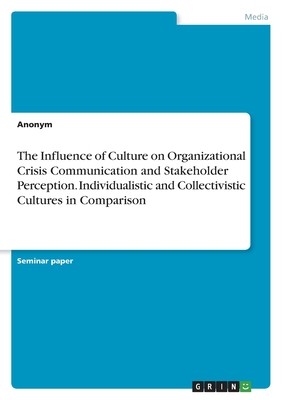
- We will send in 10–14 business days.
- Author: Anonym
- Publisher: GRIN Verlag
- Year: 2022
- Pages: 30
- ISBN-10: 3346664139
- ISBN-13: 9783346664136
- Format: 14.8 x 21 x 0.2 cm, minkšti viršeliai
- Language: English
- SAVE -10% with code: EXTRA
The Influence of Culture on Organizational Crisis Communication and Stakeholder Perception. Individualistic and Collectivistic Cultures in Comparison (e-book) (used book) | bookbook.eu
Reviews
Description
Seminar paper from the year 2018 in the subject Communications - Intercultural Communication, grade: 1,0, Johannes Gutenberg University Mainz (Institut für Publizistik), language: English, abstract: Volkswagen emissions scandal, Germanwings Flight 9525, Samsung's exploding batteries - corporate crises are becoming more and more common in today's unpredictable environment. In the course of globalization, an increasing number of multinational organizations is operating in an international setting. Thus, the likelihood and potential impact of a corporate crisis rises. At the same time, the international potential of a crisis is aggravated by the dissemination of information in near real-time due to the Internet. Especially negative information spreads with a range and speed that increases an organization's vulnerability to crises. As a result, the demand and importance of crisis communication is leaping. Due to the more complex and international surroundings of crisis communication, culture as a contextual factor in crisis communication plays a role of growing importance. In different cultures, different crisis responses by the organizations are expected because stakeholders perceive and react to messages in different ways dependent upon their culture. The probably most typical distinction of cultures is between collectivistic and individualistic societies. In the past, crisis communication research has been given too little attention to cultural contexts. Crisis communication research and theories almost exclusively focused on individualistic Western contexts. However, the growing relevance of culture in crisis communication is getting more and more evident in research. For this reason, the question of the cultural influences of individualistic and collectivistic societies on organization's crisis communication strategies as well as the stakeholders' perception of and responses to the crisis messages in different cultural settings is discussed in the present work.
EXTRA 10 % discount with code: EXTRA
The promotion ends in 21d.06:53:29
The discount code is valid when purchasing from 10 €. Discounts do not stack.
- Author: Anonym
- Publisher: GRIN Verlag
- Year: 2022
- Pages: 30
- ISBN-10: 3346664139
- ISBN-13: 9783346664136
- Format: 14.8 x 21 x 0.2 cm, minkšti viršeliai
- Language: English English
Seminar paper from the year 2018 in the subject Communications - Intercultural Communication, grade: 1,0, Johannes Gutenberg University Mainz (Institut für Publizistik), language: English, abstract: Volkswagen emissions scandal, Germanwings Flight 9525, Samsung's exploding batteries - corporate crises are becoming more and more common in today's unpredictable environment. In the course of globalization, an increasing number of multinational organizations is operating in an international setting. Thus, the likelihood and potential impact of a corporate crisis rises. At the same time, the international potential of a crisis is aggravated by the dissemination of information in near real-time due to the Internet. Especially negative information spreads with a range and speed that increases an organization's vulnerability to crises. As a result, the demand and importance of crisis communication is leaping. Due to the more complex and international surroundings of crisis communication, culture as a contextual factor in crisis communication plays a role of growing importance. In different cultures, different crisis responses by the organizations are expected because stakeholders perceive and react to messages in different ways dependent upon their culture. The probably most typical distinction of cultures is between collectivistic and individualistic societies. In the past, crisis communication research has been given too little attention to cultural contexts. Crisis communication research and theories almost exclusively focused on individualistic Western contexts. However, the growing relevance of culture in crisis communication is getting more and more evident in research. For this reason, the question of the cultural influences of individualistic and collectivistic societies on organization's crisis communication strategies as well as the stakeholders' perception of and responses to the crisis messages in different cultural settings is discussed in the present work.


Reviews